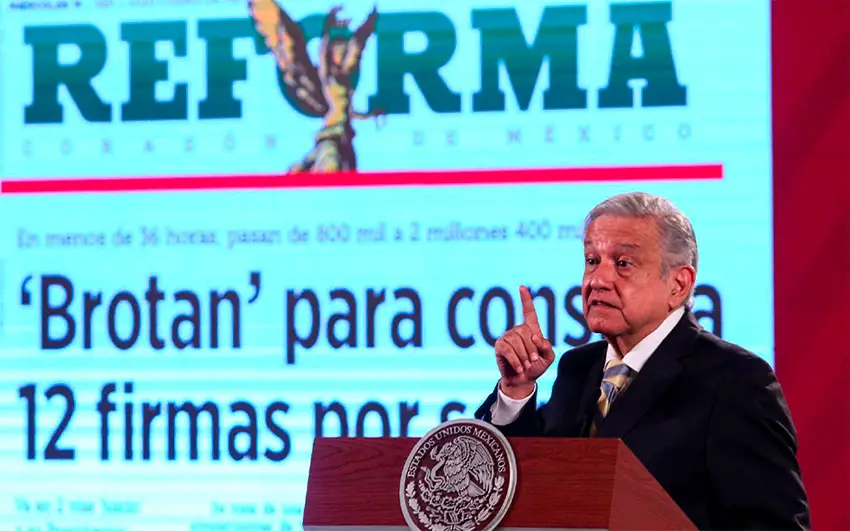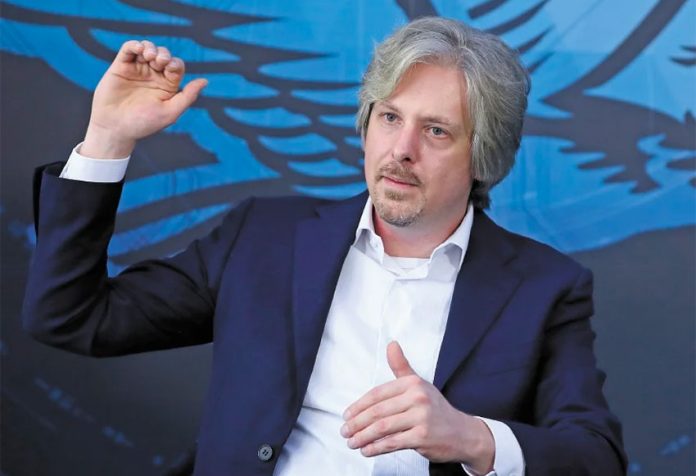Although the federal government’s frequent attacks on the media are designed to divert attention from its lack of results they also threaten freedom of expression, says the Mexico representative for a United States non-governmental organization that promotes press freedom and defends the rights of journalists.
In an interview with the newspaper El Universal, Jan-Albert Hootsen of the Committee to Protect Journalists (CPJ) expressed concern that state and municipal officials have followed the lead of President López Obrador and other federal functionaries by denigrating the media for their own political gain.
Asked to give an assessment of the current situation in Mexico in terms of freedom of expression, Hootsen responded:
“The political climate in Mexico doesn’t encourage freedom of expression. When the government of Andrés Manuel López Obrador took office we saw some positive signs; for example, the commitment to put an end to impunity, censorship and the murder of journalists.”
“Unfortunately,” he added, “almost two years later there is a climate of significant polarization, … a rhetoric of confrontation with the press [and] a division between good press and bad press.”
(López Obrador has described sections of the media critical of his government as prensa fifi, or elitist press, and “conservatives” among other disparaging terms.)
Hootsen said that it is clear that the president and other officials use such language to try to gain a political advantage.
“When there is a decision or … policy that hasn’t had the results the government wants, attacking the media is a kind of distraction,” he said, adding that the leaders of other countries use the same strategy.
“There is a very clear political communication strategy and we don’t just see this in Mexico. It also happens in the United States with Donald Trump, in Brazil with Jair Bolsonaro and in El Salvador with Nayib Bukele,” Hootsen said.
He said that attacks on the media can have serious repercussions for journalists, explaining that reporters who have been criticized by López Obrador at his weekday news conferences have received thousands of adverse and hostile messages on social media and even death threats.
“It’s a situation that all of Mexico knows about, it’s not new … and it’s something that the federal government also knows, although its practices continue to be the same in the morning [press] conferences in the National Palace,” the CPJ representative said.

Asked how the attacks on members of the media can be stopped, Hootsen responded:
“We have to continue on the path of dialogue and make it clear that certain types of statements are not acceptable. For example in the case of the magazine Nexos, it concerns me that the Ministry of Public Administration didn’t just announce an investigation against this media outlet but did so with clearly political rhetoric.”
Hootsen charged that powerful public officials and the media are not on a level playing field and that the former have a responsibility to moderate the way they express themselves.
“It’s a matter of proportionality; there are public officials who have an enormous platform with all the tools to attack the media but the media doesn’t have the same platform or reach,” he said.
The relationship between the president and the media should be based on “facts, mutual respect and a sense of equality,” Hootsen said, adding that hate speech toward the latter “doesn’t help in any way.”
“If the president believes that [media] coverage isn’t fair he can say it but he also has to respond in the correct way, … not just disparage,” he said.
Asked about the current security situation for journalists, the CPJ representative said that Mexico was the most violent country in the world last year and remains so this year.
(Press freedom advocacy organization Article 19 said this week that 2020 will likely be the most violent year in a decade for Mexico’s journalists, with four murders recorded to date.)
Hootsen said that mechanisms to protect journalists here are clearly insufficient to do the job properly because they don’t receive sufficient funding.
“They [the authorities] react after the aggression and the main factor that continues encouraging violence in Mexico is impunity,” he added.
With regard to the outlook for authorities’ treatment of the media in the final four years of López Obrador’s term, Hootsen said, “I hope that the federal and state governments reconsider their language in the public debate with the media but the reality will be quite complex because economically and socially, and in terms of security, we’re [in a] very bad [situation] in Mexico.”
In other words, the government is likely to have plenty of reasons for wanting to continue to divert attention away from its performance in managing the country’s myriad problems.
Source: El Universal (sp)
